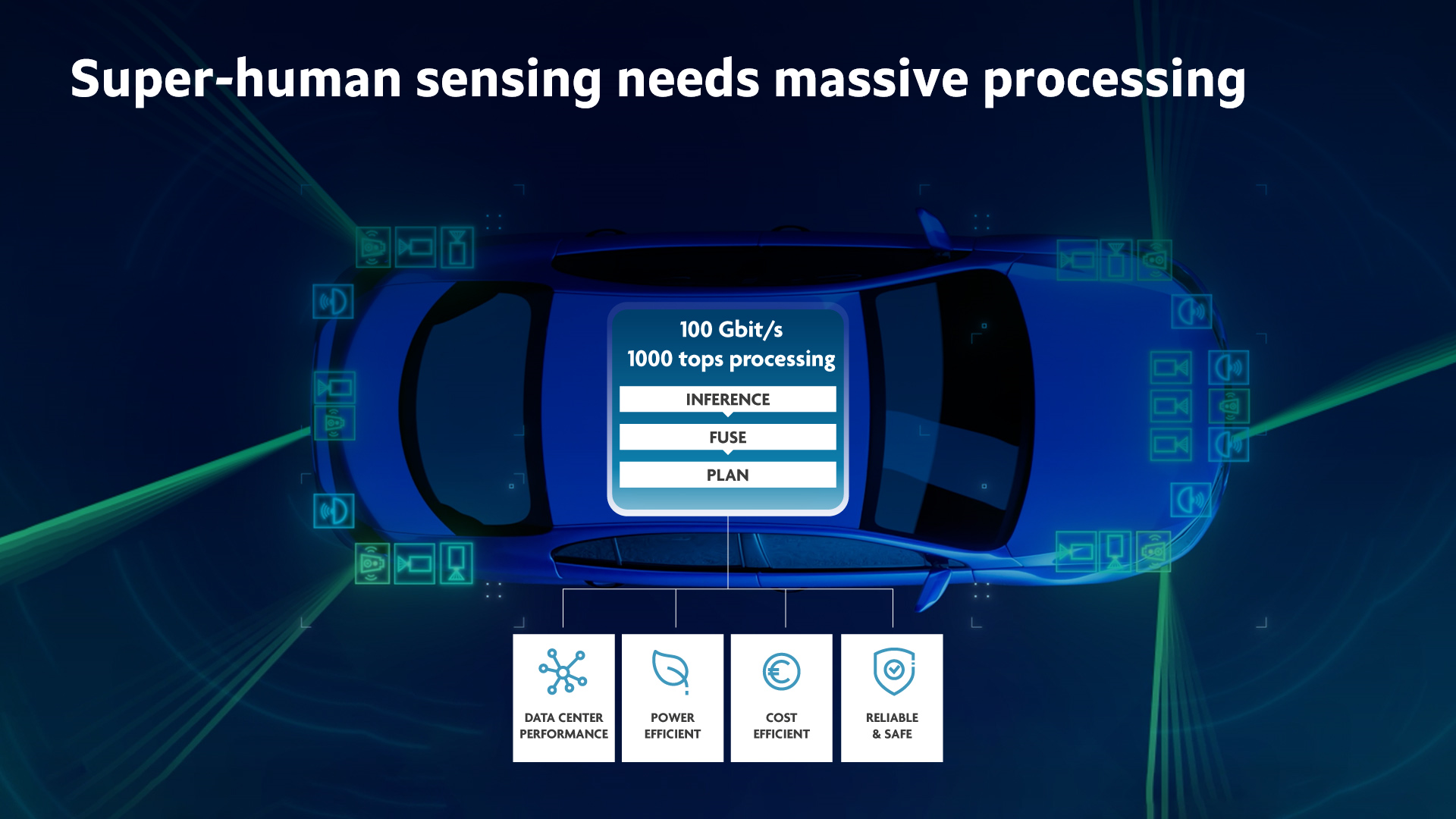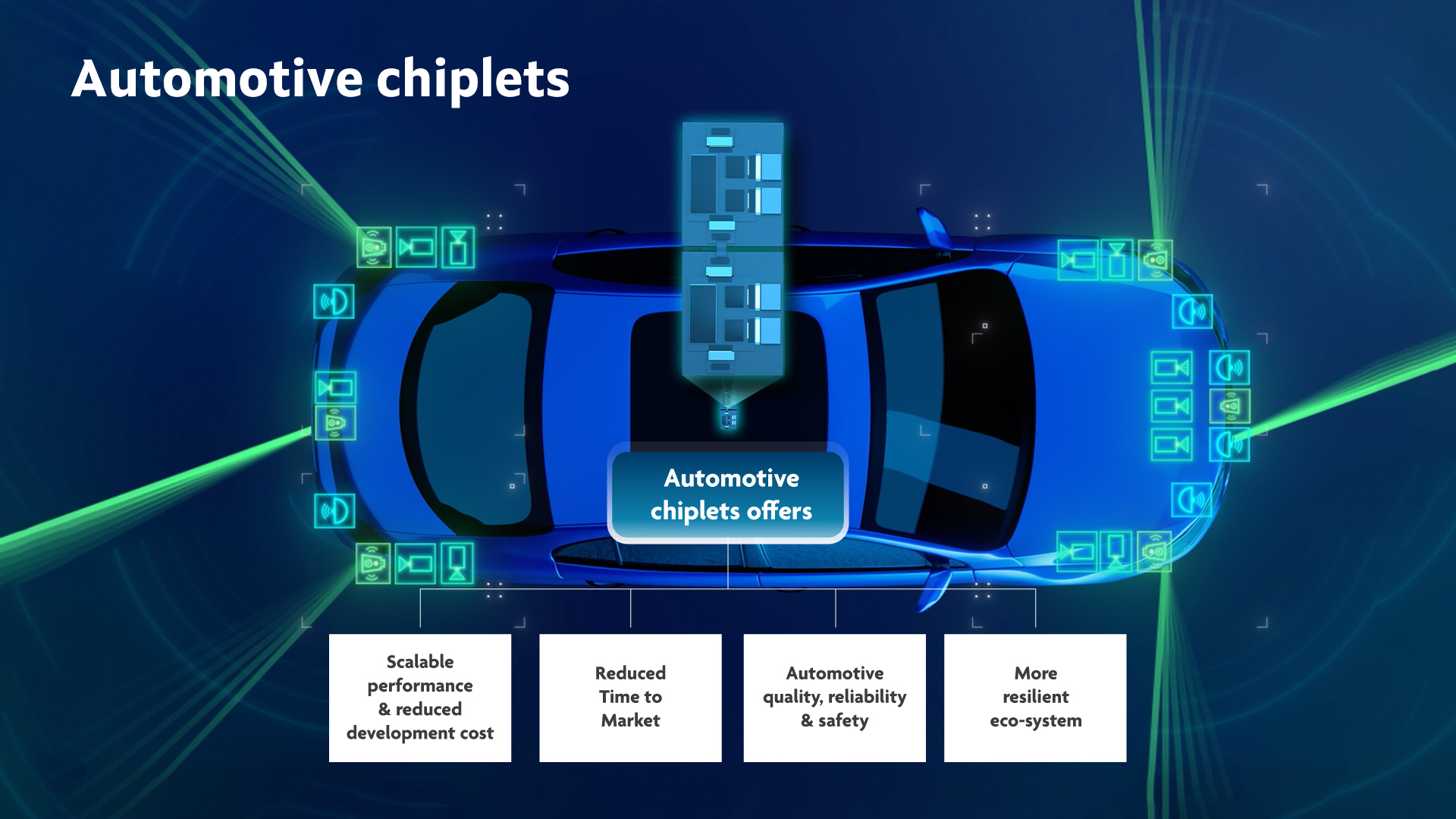- 产品
- 公司
- 支持
- 产品
Marvell Joins Imec Automotive Chiplet Initiative to Facilitate Compute SoCs for Super-human Sensing
Marvell is excited to announce that we’ve joined the automotive chiplet initiative coordinated by imec, a world-leading research and innovation hub in nanoelectronics and digital technologies. Imec has formed an informal ecosystem of leading companies from multiple automotive industry segments to address the challenge of bringing multi-chiplet compute modules to the automotive market.
The goal of imec’s automotive chiplet initiative is to address the design challenges that arise from ever-increasing data movement, processing, storage and security requirements. These demands complicate the automotive manufacturers’ desire for scalable performance to address different vehicle classes, while reducing costs and development time and ensuring consistent quality, reliability and safety.
And these demands will be made even more intense by the coming era of super-human sensing. The fusion of data from multi-spectral cameras (visible and infrared), radar and LiDAR will enable “vision” beyond human capability. Such sensor fusion will be a critical requirement for safe autonomous driving.

This new era will require data center-level processing and networking power.
As the initiative’s name implies, the development and use of chiplets is foundational to addressing these challenges.

The results of the initiative are expected to have wide-ranging impact on scalability, time to market, safety and resiliency, to name a few.
If you’re familiar with Marvell’s position as a leader in Automotive Ethernet, you’ll understand our interest and expertise in high-speed networking that must accompany such high-performance compute.
But you may be wondering how our participation in this initiative fits with that specialty. The answer is that Marvell brings to the imec ecosystem a rich history of chiplet development, including multiple generations of high-performance chiplet-based SoCs, a patented zero-overhead scalable multichip technology, and a vast portfolio of die-to-die interconnect IP foundational to chiplet-based designs.
With this experience and intellectual property behind us, the Marvell role in the initiative will be to innovate alongside other imec ecosystem members to drive current standards to be useful for automotive applications. With automotive-compatible interconnect standards in hand, the initiative will foster the growth of a broader ecosystem that can maximize chiplet technology reuse.
Chiplet reuse will reduce R&D spend and speed time to market. It will also reduce risk due to the use of known-good designs from the previous generation. Finally, it will reduce development cost, as new designs will not require a clean-slate starting point. Thus, vehicle makers will be able to more quickly design SoCs using a chiplet "Lego" approach, facilitating the development of scalable central compute SoCs to align with vehicle offerings from entry level to premium tier.
The results of the initiative will usher in a new era of compute SoC to align with the coming sensor fusion era. Consumers will be delighted to get the affordable, high-tech vehicle they crave, with zero emissions, zero accidents, and zero technology lag.
This blog contains forward-looking statements within the meaning of the federal securities laws that involve risks and uncertainties. Forward-looking statements include, without limitation, any statement that may predict, forecast, indicate or imply future events or achievements. Actual events or results may differ materially from those contemplated in this blog. Forward-looking statements are only predictions and are subject to risks, uncertainties and assumptions that are difficult to predict, including those described in the “Risk Factors” section of our Annual Reports on Form 10-K, Quarterly Reports on Form 10-Q and other documents filed by us from time to time with the SEC. Forward-looking statements speak only as of the date they are made. Readers are cautioned not to put undue reliance on forward-looking statements, and no person assumes any obligation to update or revise any such forward-looking statements, whether as a result of new information, future events or otherwise.
Tags: automotive applications, Automotive Chiplet, Automotive Ethernet, automotive market, automotive-compatible interconnect, autonomous driving, chiplet-based SoCs, compute SoC
最近推文
档案文件
类别
- 5G (12)
- AI (10)
- 汽车 (26)
- Cloud (7)
- Coherent DSP (2)
- 公司动态(100)
- Custom Silicon Solutions (1)
- 数据中心(39)
- Data Processing Units (22)
- Enterprise (25)
- ESG (6)
- 以太网适配器和控制器(12)
- Ethernet PHYs (4)
- Ethernet Switching (30)
- Fibre Channel (10)
- 网络 (31)
- Optical Modules (8)
- Security (3)
- Server Connectivity (14)
- SSD Controllers (6)
- 存储 (22)
- Storage Accelerators (2)
- What Makes Marvell (12)

